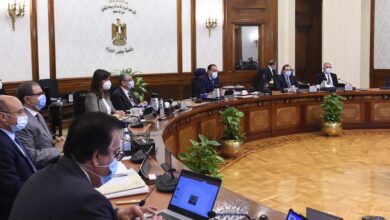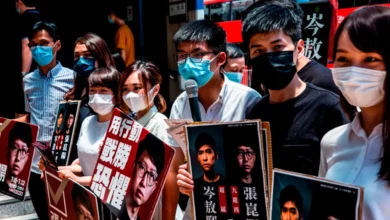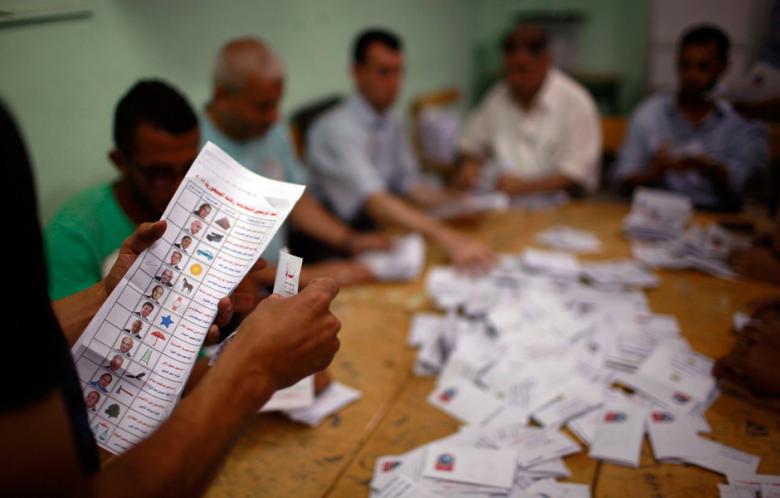Since his return to Egypt, Mohamed ElBaradei’s efforts to build a popular consensus around political reform have captivated the Egyptian activist and intellectual scene, bringing the heated debate on Egypt’s political future to a new level.
While most of ElBaradei’s support initially came from the political center and center-right, a new source is beginning to emerge: the Egyptian left. The first meeting between ElBaradei and a group of leftist activists–calling themselves Leftists supporting ElBaradei–took place on 8 June and featured discussions about ElBaradei’s recent campaign.
Leftist reactions to ElBaradei’s call for change have been divided into two main trends. One trend denies that ElBaradei’s appearance on the political stage can play a significant role in translating popular demands for social and economic justice into a democratic process for the majority of Egyptians. Conversely, other leftists prefer to engage critically with ElBaradei and his attempt to unite the widest possible spectrum of political forces from left to right.
The latter group have converged around ElBaradei in the belief that he can make a valuable contribution to the struggle for democracy in Egypt, and that it is possible to make the ElBaradei alternative more popular on a grassroots level.
To launch the meeting, the group briefly introduced itself, welcomed ElBaradei, and articulated its vision for change.
ElBaradei then took the stage. He began his talk by stressing the need to break the “fear barrier” that has deterred Egyptians from participating in politics for 58 years. The absence of democracy, he said, has made Egypt stagnant, especially in comparison to other countries, like South Korea, which stood at roughly the same level of development in the 1960s, but which have now surpassed Egypt. He also noted that his experience as ex-chief of the International Atomic Energy Agency puts him in a strong position to observe the comparative progress of countries from diverse backgrounds.
Although most of the attendees agreed with ElBaradei that democracy is key to any country’s advancement and to unleashing its citizens’ creative potential, the discussion that followed revealed that the leftists and ElBaradei have two qualitatively different–though by no means opposite–understandings of democracy.
Emad Atiyyah, a leading leftist activist and the discussion moderator, argued that the definition of democracy cannot be confined to voting rights and ballot box results. Democracy, argued Atiyyah, involves a process of struggle against all forms of oppression, political dictatorship, economic domination, and social exploitation.
ElBaradei, on the other hand, advocated for what he calls “socialist democracy”: a system that guarantees both political freedoms and social and economic rights, maintains a balance between the public and private sectors, and promotes the role of the state in empowering unprivileged segments of society. He reminded the audience that even though Egypt has recently dropped any mention of the word socialism from its constitution, developed countries like France still maintain such references.
ElBaradei concluded by saying that he can’t promote political change alone; Egyptians must assume this responsibility collectively. They must take risks and actively participate in politics in order to secure a better future for their country.
ElBaradei’s talk elicited a number a critical interventions from the audience, generating a productive discussion about democratic reform, social movements, and his own political agenda.
Amr Abdelrahman, a doctoral student at Essex University, argued that the so-called “fear barrier” has already begun to erode through popular struggle. Relentless workers strikes, which have escalated in front of the People’s Assembly during the past months, and peasant protests challenging land tenure laws and the “resurgence of feudalism” in the countryside are evidence.
Abdelrahman highlighted a paradox in Egyptian politics and social movements: people may fear signing on to the charter of ElBaradei’s National Association for Change (NAC), but at the same time have the courage to challenge the regime through strikes in front of parliament.
Contrasting the Egyptian experience with other recent examples in Latin America, particularly the Brazilian Workers Party, Abdel-Rahman said that ElBaradei’s arrival has bolstered the movement for democracy in Egypt, but that the movement still lacks any structural organization that can connect demands for democratic reform with the daily strikes and popular struggles happening all over the country.
ElBaradei’s recent meeting with Muslim Brotherhood (MB) parliamentary bloc leader Mohamed Saad el-Katatny was the subject of much debate. Some argued that the MB’s contradictory reactions to the meeting reflect their oscillating and uncertain political positions.
Samer Soliman, professor of political economy at the American University in Cairo, argued “there is no democracy without democrats”, and emphasized that democracy should be prioritized over the idea of “national consensus” which may include non-democratic elements.
ElBaradei replied that he knows where to draw the line between himself and the MB, identifying the right of women and Copts to run for presidency as one such area of difference. However, building a democratic consensus, he said, requires the inclusion of any political trend that accepts the principles democracy and civic belonging, including the MB which holds almost 20 percent of seats in parliament.
Ahmad Fawzy, a leftist NGO manger, commented that ElBaradei’s progressive stand on religious freedom (for Copts and Baha’is in particular) and equal citizenship has generated a positive response from the educated middle class and intelligentsia, some of whom had previously exhibited more conservative leanings. Zeinab Abul-Magd, professor of history at Oberlin college, underscored the importance of spreading the NAC campaign outside of Cairo and other major cities to the countryside and rural peripheries.
The meeting took a turning point when Farid Zahran, the director of al-Mahrousa Press and al-Balad library, responded to ElBaradei’s repeated reference to collective responsibility by advising him to take more decisive political positions and not shy away from running for presidency. This, said Zahran, would encourage more people to participate in Egypt’s budding political movement.
“There is no use in raising people’s ambitions for change while holding back on the presidential battle,” said Zahran. “We can’t leave the future of Egypt’s presidency to chance. Overthrowing the dictatorship has no meaning if there does not exist a ‘clear polarization’ within the state and society between democratic and non-democratic forces.”
In response, ElBaradei insisted on the importance of mutual trust and responsibility. He argued that “collecting signatures” is one realistic and effective means of changing the status quo, while announcing his presidential candidacy before securing constitutional reforms that guarantee free and fair elections would have an adverse effect and could renew the regime’s legitimacy.
The debate had a controversial yet dynamic rhythm. It concluded with a common statement on the necessity of democracy in Egypt. But some questions remain unanswered. For one, NAC is unlikely to succeed in creating a democratic movement unless it learns from the mistakes of its predecessors. The experience of the Kefaya movement, which emerged in 2004, offers many lessons as it failed to politicize existing social struggles and to unify isolated demands under the mantle of a single political cause. On the other hand, the left is still stuck in a historical crisis and remains largely unable to overcome internal disputes and to build grassroots organizations capable of empowering workers, peasants and other marginalized segments of Egyptian society.




